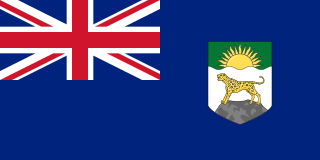
Northern Rhodesia was a protectorate in south central Africa, formed in 1911 by amalgamating the two earlier protectorates of Barotziland-North-Western Rhodesia and North-Eastern Rhodesia. It was initially administered, as were the two earlier protectorates, by the British South Africa Company (BSAC), a chartered company on behalf of the British Government. From 1924 it was administered by the British Government as a protectorate under similar conditions to other British-administered protectorates, and the special provisions required when it was administered by BSAC were terminated.

The Alliance Party, was the ruling political party in Fiji from 1966 to 1987. Founded in the early 1960s, its leader was Ratu Sir Kamisese Mara, the founding father of the modern Fijian nation. Widely seen as the political vehicle of the traditional Fijian chiefs, the Alliance Party also commanded considerable support among the Europeans and other ethnic minorities, who, although comprising only 3–4% of Fiji's population, were over represented in the parliament. Indo-Fijians were less supportive, but the Fijian-European block vote kept the Alliance Party in power for more than twenty years.

Sir Roland "Roy" Welensky, KCMG was a Northern Rhodesian politician and the second and last prime minister of the Federation of Rhodesia and Nyasaland.

The United Federal Party (UFP) was a political party in the Federation of Rhodesia and Nyasaland.
The Rhodesia general election of 30 July 1974 saw the Rhodesian Front of Ian Smith re-elected, once more winning every one of the 50 seats elected by white voters.
The Southern Rhodesia general election of 1962 took place on 14 December 1962. Voters elected 65 members of the Legislative Assembly. The election was notable for bringing to power the Rhodesian Front, initially under Winston Field, which set the colony on the course for its eventual Unilateral Declaration of Independence.
The Southern Rhodesia Legislative Council election of 30 April 1920 was the seventh election to the Legislative Council of Southern Rhodesia. At this election the Legislative Council comprised thirteen elected members, together with six members nominated by the British South Africa Company, and the Administrator of Southern Rhodesia. The Resident Commissioner of Southern Rhodesia, Crawford Douglas Douglas-Jones, also sat on the Legislative Council ex officio but without the right to vote.

The Rhodesia Labour Party was a political party which existed in Southern Rhodesia from 1923 until the 1950s. Originally formed on the model of the British Labour Party from trade unions and being especially dominated by railway workers, it formed the main opposition party from 1934 to 1946. The party suffered a catastrophic split during the Second World War and lost all its seats, and a further split over the attitude to the Federation of Rhodesia and Nyasaland ended its involvement in Rhodesian politics.
The Federation of Rhodesia and Nyasaland general election of 15 December 1953 was the first election to the legislative assembly of the Federation of Rhodesia and Nyasaland, which had been formed a few months before. The election saw a landslide victory for the Federal Party under Godfrey Huggins, who had been Prime Minister of Southern Rhodesia for the past 20 years.
The Southern Rhodesia general election of 15 September 1948 saw the Prime Minister Godfrey Huggins regain the overall majority he had lost at the previous election. Huggins won a landslide, reducing the opposition Liberal Party to a small minority.
The colonial history of Southern Rhodesia is considered to be a time period from the British government's establishment of the government of Southern Rhodesia on 1 October 1923, to Prime Minister Ian Smith's unilateral declaration of independence in 1965. The territory of 'Southern Rhodesia' was originally referred to as 'South Zambezia' but the name 'Rhodesia' came into use in 1895. The designation 'Southern' was adopted in 1901 and dropped from normal usage in 1964 on the break-up of the Federation of Rhodesia and Nyasaland, and Rhodesia became the name of the country until the creation of Zimbabwe Rhodesia in 1979. Legally, from the British perspective, the name Southern Rhodesia continued to be used until 18 April 1980, when the name Republic of Zimbabwe was formally proclaimed.

General elections were held in Northern Rhodesia on 20 March 1959, although voting did not take place in two constituencies until 9 April. The United Federal Party (UFP) was expected to win the elections, and did so by taking 13 of the 22 elected seats on the Legislative Council.

General elections were held for the first time in Nyasaland on 15 March 1956.
Federal elections were held in the Federation of Rhodesia and Nyasaland on 12 November 1958. The result was a victory for the ruling United Federal Party, with Roy Welensky remaining Prime Minister.
The Confederate Party was a political party in the Federation of Rhodesia and Nyasaland.
The Dominion Party was a political party in the Federation of Rhodesia and Nyasaland, led by Winston Field.
The Capricorn Africa Society was a multiracial pressure group in British colonies in southern and eastern Africa in the 1950s and 1960s.
Maureen Thelma Watson was a Rhodesian politician.
Michael Hill Blackwood (1917-2005) was a lawyer and politician who spent most of his working life in colonial Nyasaland and in Malawi in the early years of its independence. Although he represented the interests of European settlers before independence and opposed both the transfer of power to the African majority and the break-up of the Federation of Rhodesia and Nyasaland, after Malawi’s independence, he remained in the country as a member of its legislature until his retirement.








